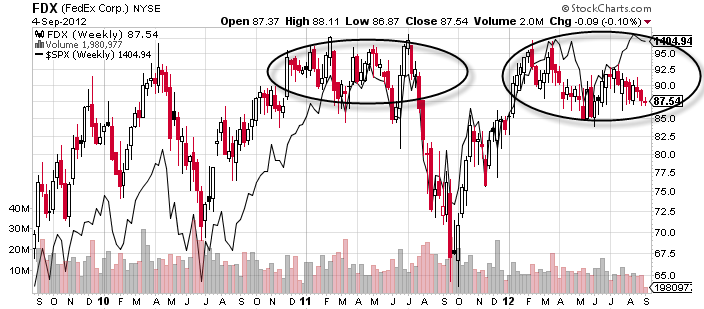By: Michael Kramer
There will be three large Treasury settlements on Tuesday, Thursday, and Friday, with roughly $130 billion set to be drained from the overnight funding market. The reverse repo facility ended the week at just $80 billion on Friday, down from $214 billion on July 31. With the facility now essentially depleted, any further increase in the TGA will need to come from other sources, which likely means reserves will begin to take a hit.
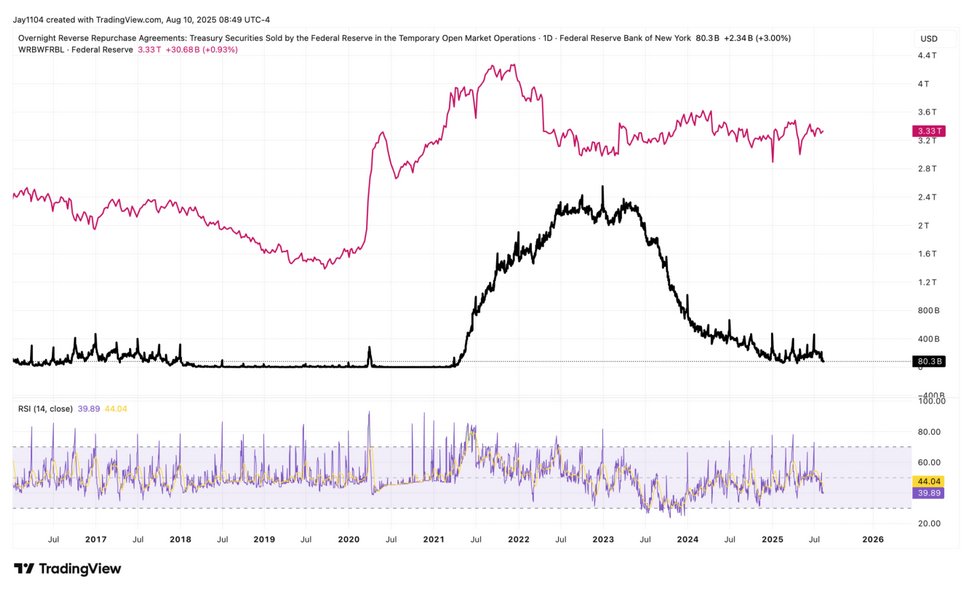
The overnight repo rate average has been running higher this month than it did in May and June, and is more in line with the range seen in February and March.
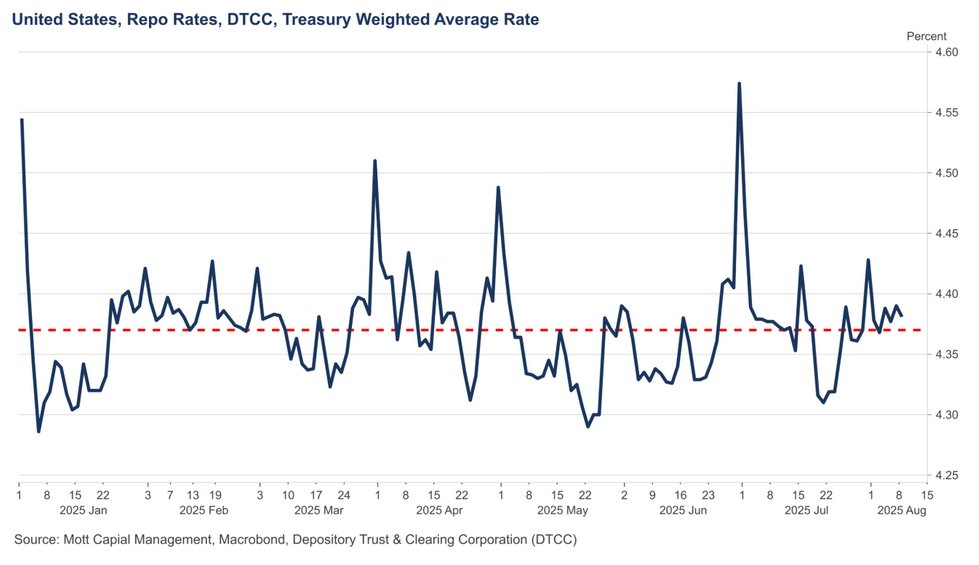
There is not much that can be done here, all one can do is take an educated guess as to where the funding will come from for all of the these settlements of Treasuries that are being issued, and in the end the days of excess liquidity are pretty much over, with the reverse repo facility nearing the effective lower bound.
Central banks worldwide are still in the process of shrinking their balance sheets. The only central bank currently in an expansion phase is the People’s Bank of China. China has very tight capital controls, and I would assume that the vast majority of capital generated in China remains within the country. There are ways, perhaps, for it to come out in Bitcoin and gold, but who knows how much actually comes through those channels.
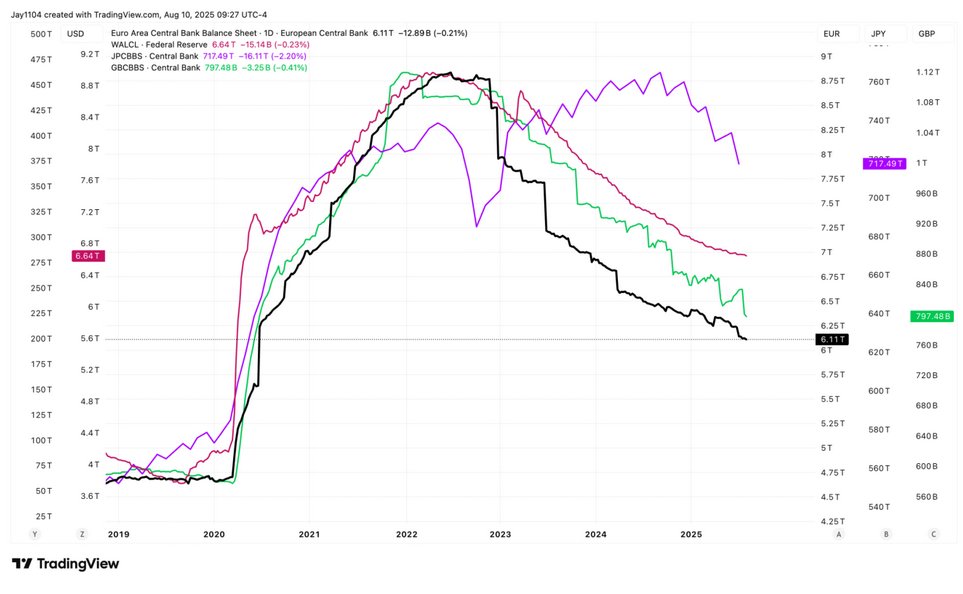
The question to ask when it comes to China is that if liquidity in China is rising, why isn’t the stock market rising? It has been effectively range-bound since the fall of 2024. I don’t think China’s balance sheet gains are having a significant impact on global markets.
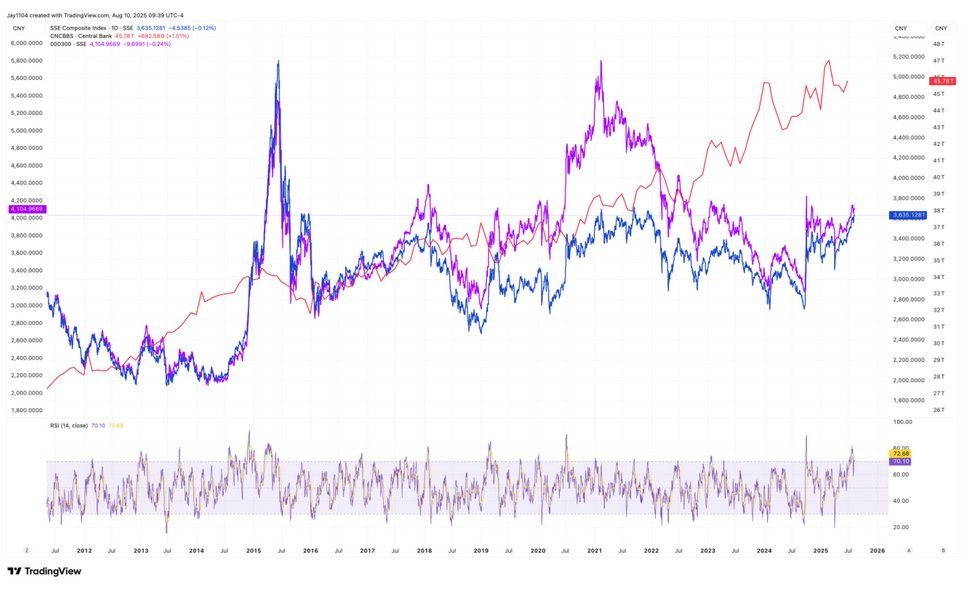
As the Treasury issues more debt, it must be funded from somewhere — and with excess liquidity essentially drained, the question is from where. This is the central issue now. It could mean higher long-end rates, lower stock prices, or a draw from money market accounts. Whatever the case, the cash has to come from somewhere. When conditions tighten, repo rates tend to rise, making it worthwhile to keep a close watch on SOFR daily.
On Friday, the S&P 500 rose about 78 bps, while the equal-weight RSP ETF gained just 18 bps. The advance was driven largely by Apple’s strong performance rather than broad market strength. Notably, Apple’s stock price and implied volatility both rose — a sign that heavy call buying is pushing up IV, which typically occurs during a gamma squeeze.
Market breadth has been weak in recent weeks, likely tied to the ongoing liquidity drain. For a clearer picture of what’s really happening, it’s worth paying more attention to areas outside the major indexes, such as the DIA, IWM, and RSP.
Originally posted on August 10, 2025 on Mott Capital Management
PHOTO CREDIT: https://www.shutterstock.com/g/smartman
VIA SHUTTERSTOCK
FOOTNOTES AND SOURCES
Terms By ChatGPT
- Treasury Settlements – The process of finalizing the purchase of newly issued U.S. Treasury securities, where cash changes hands between buyers and the Treasury.
- Overnight Funding Market – The short-term lending market where financial institutions borrow and lend cash overnight, often secured by collateral like Treasuries.
- Reverse Repo Facility (RRP) – A Federal Reserve tool allowing eligible institutions to lend cash to the Fed overnight in exchange for securities, effectively absorbing excess liquidity from the financial system.
- TGA (Treasury General Account) – The U.S. Treasury’s operating account at the Federal Reserve, used to manage government cash flows.
- Reserves – Bank deposits held at the Federal Reserve, which serve as a key source of liquidity in the financial system.
- Overnight Repo Rate – The interest rate charged for overnight repurchase agreements, where securities are sold and later repurchased, often used as a benchmark for short-term funding conditions.
- SOFR (Secured Overnight Financing Rate) – A benchmark interest rate for overnight loans secured by U.S. Treasuries, widely used in financial contracts.
- Gamma Squeeze – A rapid price increase driven by heavy call option buying, forcing market makers to purchase the underlying stock to hedge, further pushing up prices.
- Market Breadth – A measure of how many stocks are participating in a market move, indicating whether gains are broad-based or concentrated in a few names.
- Equal-Weight ETF (RSP) – An exchange-traded fund that assigns equal portfolio weight to each S&P 500 constituent, rather than weighting by market capitalization.
DISCLOSURES
This report contains independent commentary to be used for informational and educational purposes only. Michael Kramer is a member and investment adviser representative with Mott Capital Management. Mr. Kramer is not affiliated with this company and does not serve on the board of any related company that issued this stock. All opinions and analyses presented by Michael Kramer in this analysis or market report are solely Michael Kramer’s views. Readers should not treat any opinion, viewpoint, or prediction expressed by Michael Kramer as a specific solicitation or recommendation to buy or sell a particular security or follow a particular strategy. Michael Kramer’s analyses are based upon information and independent research that he considers reliable, but neither Michael Kramer nor Mott Capital Management guarantees its completeness or accuracy, and it should not be relied upon as such. Michael Kramer is not under any obligation to update or correct any information presented in his analyses. Mr. Kramer’s statements, guidance, and opinions are subject to change without notice. Past performance is not indicative of future results. Neither Michael Kramer nor Mott Capital Management guarantees any specific outcome or profit. You should be aware of the real risk of loss in following any strategy or investment commentary presented in this analysis. Strategies or investments discussed may fluctuate in price or value. Investments or strategies mentioned in this analysis may not be suitable for you. This material does not consider your particular investment objectives, financial situation, or needs and is not intended as a recommendation appropriate for you. You must make an independent decision regarding investments or strategies in this analysis. Upon request, the advisor will provide a list of all recommendations made during the past twelve months. Before acting on information in this analysis, you should consider whether it is suitable for your circumstances and strongly consider seeking advice from your own financial or investment adviser to determine the suitability of any investment.

